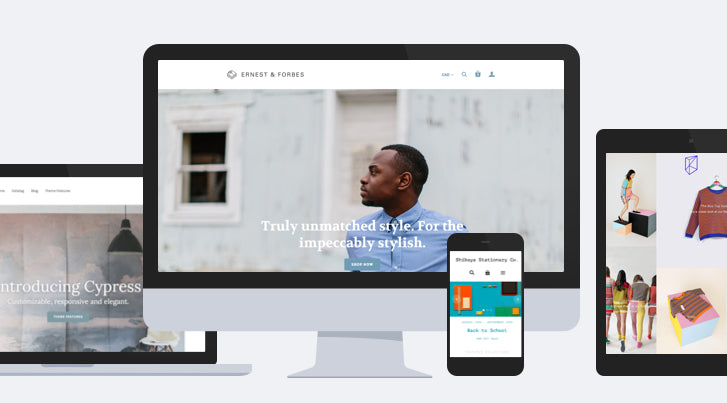It’s become kind of a running gag over the past few months: on Monday, almost invariably, a new team member (or three) appears on Slack. The welcome wagon pulls up, the gifs and emojis pour out.

Meanwhile, we take to private messages to find out what we can.

Whatever scoop there is, we trade it furiously amongst ourselves for a few minutes until someone in the know comes along and unravels the mystery…

There’s not a lot of people here at Pixel Union who remember how things used to be—that’s because most people in the company weren’t in the company at the beginning of the year. Since 2009, we’ve enjoyed a reputation as a small, upstart theme provider, based in beautiful Victoria, BC. We got our start and became especially well-known making Tumblr themes, with some pretty big names on our client list—The White House, McDonald’s, the LA Lakers, to name a few—but “small” was always a word you would use to describe us.
Not anymore. Today, besides selling our in-house ecommerce themes, we’ve become a go-to for bigger businesses wanting custom stores that reflect their brands and customers. We’ve also entered into several large-scale, long-term partnerships that require us to house whole new teams. Since the start of 2015, we’ve grown faster than any of us could have predicted: from 15 to 40 employees. We have permanent openings for designers, developers, and QA/support staff. Last week, we finally cracked and hired an office assistant.
So how did we scale up so fast and still manage to feel like a tight-knit bunch? How come nothing feels “broken” the way it does in many other rapidly growing companies?
There’s no simple formula (if there was, we’d have bottled it and all become billionaires by now), but here are the eight things that we think helped us grow as a company and stay healthy.
You might also like: How Pixel Union Diversified Their Service Offerings and 10x’d Their Business
We cared about culture.
We hosted company events and got involved in the community—things that don’t necessarily add to our bottom line, but that bring us together and make for a stronger culture. In July, we rented out a lawn bowling club, brought our team over from the mainland, and threw a party. Last week, a bunch of us got our hands dirty volunteering at a community farm, and pretty soon we’ll be holding a clothing drive and serving breakfast at a shelter here in town.
Culture is something we come back to again and again. It’s what keeps us together and keeps us coming into the office on rainy days (it rains a lot here). At the same time, culture is what sets us apart from other companies and gives us our unique identity.
Culture sets us apart from other companies and gives us our unique identity.
Too often you see companies scale too quickly and start to fracture; their foundation isn’t strong enough to handle rapid growth. A strong foundation is as much about a vibrant company culture as it is about a great business idea or revenue model.
By caring about and doing things to nurture our culture—from opening our lines of communication to implementing employee-first policies—we ended up with a foundation strong enough to support our growth. We took care of ourselves and each other, instilled confidence, and our business didn’t break.
We stayed flexible.
We understood the value of allowing employees to work remotely. This is a lesson that applies to any business anywhere, but especially when you live in an isolated place like Victoria. The days of requiring employees to be in the office from 9 to 5 just don’t fly anymore if you want to work with the most talented people and not be limited by location.

The other great thing about remote employees is the diverse outlook they bring to the table. Instead of our projects being viewed through a purely local lens, we have people of all kinds of different backgrounds and perspectives giving us their take on things.
One more point on that note: we’ve heard companies say they’re afraid remote employees won’t be as productive. That hasn’t been the case for us. We have team members in the U.S., Europe, and Australia, and they’re as productive as anyone here in Victoria.
We invested in our office.
As much as we love our remote employees, we want people to be here, too. So we moved into a beautiful, sustainably-restored heritage building in the heart of downtown, with a huge wraparound balcony and a killer view of Victoria’s inner harbour—a great place to watch the Canada Day fireworks and hang out with the seagulls who keep us company all year round.
Since moving up to the top floor, we’ve added more comfortable work spaces and introduced weekly events like Waffle Wednesday. Improvements to the office aren’t only about making our local employees feel more at home—they help us attract new candidates and clients when they stop by for interviews and meetings.
We used great tools.
It’s no surprise that good web design and development require great tools—but equally important are the tools that help us function as a team. With that in mind, we’ve made big efforts to streamline our workflow, choose the right tools, get all our employees on board, and keep an eye open for new and better technologies.

We’ve already mentioned Slack, which needs no further introduction. It’s where the bulk of our communication takes place. For task management we use Flow, which helps us organize projects and to-do lists. We migrated all our files onto Google Drive so they can be accessed anywhere, by anybody, at any time. Most recently, we moved all our employee information into Kin HR, which simplifies our onboarding for new employees and helps us track everything from birthdays to time off.
Great tools like these make it easy for new team members to jump in and work flexibly. They also make it easier for us to take on remote employees and scale quickly.
We had better meetings.
This one might seem a bit against the grain, but we realized how important it is to have everyone on the same page—and that means regular meetings. Slack is an amazing tool for workplace communication, but it’s no replacement for the old-school in-person team throwdown.
Too much silence can be devastating to a team.
We introduced all-hands meetings as a way of supporting our growing team. We used these meetings to welcome new people, and give everyone a chance to be heard and feel comfortable enough to ask questions. We schedule them bright and early so our folks on the other side of the globe have a chance to participate via Google Hangouts.
We also love our one-on-ones. Project leads take time every month to meet individually with everyone on our team, from designers to developers to QA and support staff. This makes sure everyone has a voice and no one's ideas slips through the cracks. If a problem is raised, it’s caught early enough to find a solution. Too much silence can be devastating to a team.
You might also like: 10 Web Design Tools to Discover Beautiful Fonts for Your Next Project
We made buddies.
One of the newest things we’ve done is implement a buddy system for new hires. During onboarding, every new employee is paired with someone on the team who becomes a buddy, mentor, and all-around answerer of “dumb” questions.
It’s been a helpful addition regardless of where new team members are located, but where it really shines is when a new remote employee joins our team. If you’ve ever worked remotely, you know how easy it is to get started on the wrong foot, and consequently not feel like you’re part of the team.
Teaming people up right out of the gate ensures there’s at least one person for that new employee to connect with, and that becomes a gateway for all the other relationships that follow. In our company, those relationships lead to a better culture, more collaboration, and an overall healthier work environment.
We chose to stay.
In this industry, “scaling up” often means moving headquarters—to San Francisco, Toronto, or any number of bigger cities. We went the other direction. We decided to stay.
Our choice to keep our headquarters in Victoria—a small city on an island in the Pacific Ocean—was about creating an environment with a healthier work-life balance, in a place where people want to live. We have an easier time hiring locally and getting the best from the great pool of talent here, because although Victoria is home to some prolific and growing companies, there’s no behemoth like Apple or Google to demolish the competition.
Also, Victoria is only a two-hour flight from San Francisco. We have it good here.
We didn’t compromise.
Quality of work has always been our number-one priority at Pixel Union. It’s what got us where we are today, first earning us a reputation as a world-class theme provider, then bringing in new and bigger business and custom projects to the point that it was time to scale up.

As we grew, we made sure our work never suffered; as more people came on board, we introduced better processes and peer review systems to ensure that, first and foremost, our work remained high-quality. We didn’t just hire designers and developers; we hired additional QA and support staff to make sure every project we deliver is airtight and checked from top to bottom. Whether it’s one of our in-house Shopify themes or a larger project for one of our enterprise clients, the one thing we will never, ever do is compromise our work.
In short, we grew as a team.
Great design can’t be produced in a factory. Neither can a great team. It takes a company-wide commitment to things like culture and flexibility to bring good people together and keep them on the same page. It takes investing in the right tools and the right setting to make sure every employee feels present, even if they’re time zones away. And it takes constant and careful evaluation of what got you there in the first place—building great products—to make sure the quality of your work never falters.
Hopefully some of what we’ve learned can be useful to your business, helping you communicate better, collaborate better, and build a stronger foundation to get you where you’re going—or growing.
You might also like: 2 Guys. 6 Months. 7 Apps.

